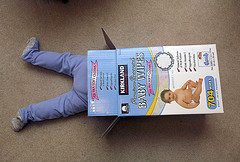When You Cut Trash Collection To Every Two Weeks, Parents Will Still Find A Way To Get Rid Of Dirty Diapers
See, Portland continues to do weekly recycling pickups, and all those empty cereal boxes and soup cans provide all the nooks and crevices a desperate parent might need to stash a dirty diaper and rid their house of the stink without having to wait another week.
“It started when the city went to every other week garbage pickup,” the president of Far West Fibers, which handles much of the curbside recycling for Portland, tells Oregon Public Broadcasting. “Prior to that you’d get a dirty diaper maybe once a month. Now we get 60 pounds per shift. It’s not pretty.”
So that once-monthly dirty diaper has grown into 120 pounds per day.
And it used to be worse when the twice-monthly garbage collection schedule began — 90 pounds per shift (presumably 180 pounds per day). But efforts to tag and cite recycling bins full of trash have helped somewhat.
“In the grand scheme of things, the amount of dirty diapers we get is an extremely small percentage, but it’s by far the most disgusting percentage,” said the Far West Fibers president. “It’s never a good idea to expose your employees to dirty diapers. It’s nothing I ever thought I’d have to do, nor do I want to keep doing it.”
Want more consumer news? Visit our parent organization, Consumer Reports, for the latest on scams, recalls, and other consumer issues.


